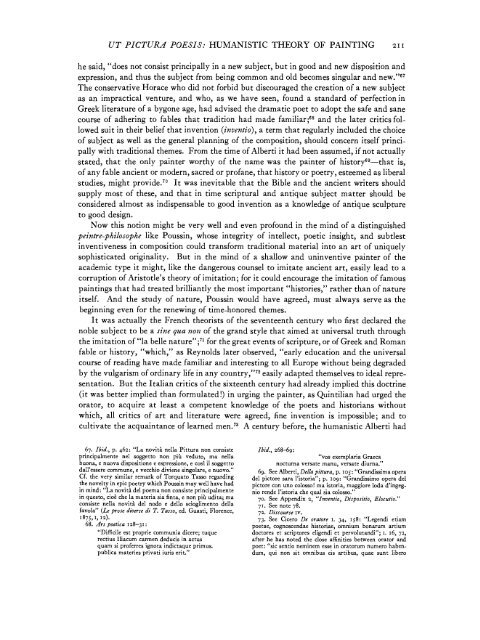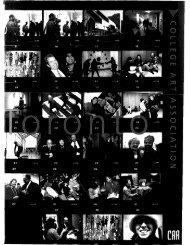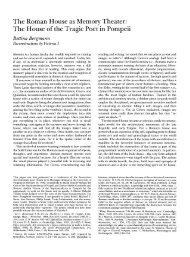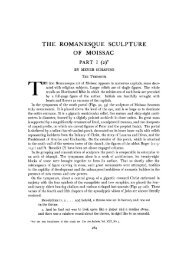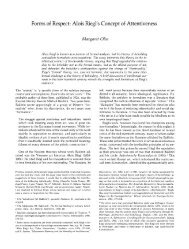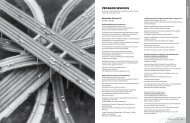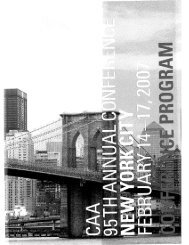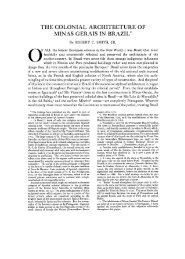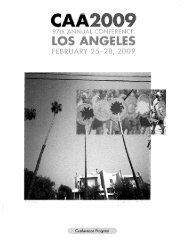THE HUMANISTIC THEORY OF PAINTING - College Art Association
THE HUMANISTIC THEORY OF PAINTING - College Art Association
THE HUMANISTIC THEORY OF PAINTING - College Art Association
You also want an ePaper? Increase the reach of your titles
YUMPU automatically turns print PDFs into web optimized ePapers that Google loves.
UT PICTURA POESIS: <strong>HUMANISTIC</strong> <strong>THE</strong>ORY <strong>OF</strong> <strong>PAINTING</strong> 211<br />
he said, "does not consist principally in a new subject, but in good and new disposition and<br />
expression, and thus the subject from being common and old becomes singular and new."''67<br />
The conservative Horace who did not forbid but discouraged the creation of a new subject<br />
as an impractical venture, and who, as we have seen, found a standard of perfection in<br />
Greek literature of a bygone age, had advised the dramatic poet to adopt the safe and sane<br />
course of adhering to fables that tradition had made familiar;"6 and the later critics fol-<br />
lowed suit in their belief that invention (inventio), a term that regularly included the choice<br />
of subject as well as the general planning of the composition, should concern itself princi-<br />
pally with traditional themes. From the time of Alberti it had been assumed, if not actually<br />
stated, that the only painter worthy of the name was the painter of history69-that is,<br />
of any fable ancient or modern, sacred or profane, that history or poetry, esteemed as liberal<br />
studies, might provide.70 It was inevitable that the Bible and the ancient writers should<br />
supply most of these, and that in time scriptural and antique subject matter should be<br />
considered almost as indispensable to good invention as a knowledge of antique sculpture<br />
to good design.<br />
Now this notion might be very well and even profound in the mind of a distinguished<br />
peintre-philosophe like Poussin, whose integrity of intellect, poetic insight, and subtlest<br />
inventiveness in composition could transform traditional material into an art of uniquely<br />
sophisticated originality. But in the mind of a shallow and uninventive painter of the<br />
academic type it might, like the dangerous counsel to imitate ancient art, easily lead to a<br />
corruption of Aristotle's theory of imitation; for it could encourage the imitation of famous<br />
paintings that had treated brilliantly the most important "histories," rather than of nature<br />
itself. And the study of nature, Poussin would have agreed, must always serve as the<br />
beginning even for the renewing of time-honored themes.<br />
It was actually the French theorists of the seventeenth century who first declared the<br />
noble subject to be a sine qua non of the grand style that aimed at universal truth through<br />
the imitation of "la belle nature";" for the great events of scripture, or of Greek and Roman<br />
fable or history, "which," as Reynolds later observed, "early education and the universal<br />
course of reading have made familiar and interesting to all Europe without being degraded<br />
by the vulgarism of ordinary life in any country,"72 easily adapted themselves to ideal repre-<br />
sentation. But the Italian critics of the sixteenth century had already implied this doctrine<br />
(it was better implied than formulated!) in urging the painter, as Quintilian had urged the<br />
orator, to acquire at least a competent knowledge of the poets and historians without<br />
which, all critics of art and literature were agreed, fine invention is impossible; and to<br />
cultivate the acquaintance of learned men.73 A century before, the humanistic Alberti had<br />
67. Ibid., p. 462: "La novita nella Pittura non consiste<br />
principalmente nel soggetto non pidi veduto, ma nella<br />
buona, e nuova dispositione e espressione, e cosl il soggetto<br />
dall'essere commune, e vecchio diviene singolare, e nuovo."<br />
Cf. the very similar remark of Torquato Tasso regarding<br />
the novelty in epic poetry which Poussin may well have had<br />
in mind: "La novith del poema non consiste principalmente<br />
in questo, cioe che la materia sia finta, e non pidi udita; ma<br />
consiste nella novita del nodo e dello scioglimento della<br />
favola" (Le prose diverse di T. Tasso, ed. Guasti, Florence,<br />
1875, I, 12).<br />
68. Ars poetica 128-31:<br />
"Difficile est proprie communia dicere; tuque<br />
rectius Iliacum carmen deducis in actus<br />
quam si proferres ignota indictaque primus.<br />
publica materies privati iuris erit."<br />
Ibid., 268-69:<br />
"vos exemplaria Graeca<br />
nocturna versate manu, versate diurna."<br />
69. See Alberti, Della pittura, p. o05: "Grandissima opera<br />
del pictore sara l'istoria"; p. Io9: "Grandissimo opera del<br />
pictore con uno colosso! ma istoria, maggiore loda d'ingeg-<br />
nio rende l'istoria che qual sia colosso."<br />
70. See Appendix 2, "Inventio, Dispositio, Elocutio."<br />
71. See note 78.<br />
72. Discourse Iv.<br />
73. See Cicero De oratore I. 34, 158: "Legendi etiam<br />
poetae, cognoscendae historiae, omnium bonarum artium<br />
doctores et scriptores eligendi et pervolutandi"; i. 16, 72,<br />
after he has noted the close affinities between orator and<br />
poet: "sic sentio neminem esse in oratorum numero haben-<br />
dum, qui non sit omnibus eis artibus, quae sunt libero


